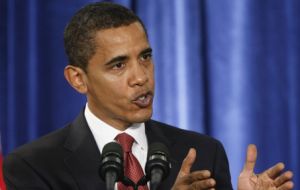MercoPress. South Atlantic News Agency
Obama wants to end tax loopholes for US corporations overseas
 US tax collectors target: 210 billion in ten years
US tax collectors target: 210 billion in ten years President Barack Obama has proposed outlawing offshore tax-avoidance techniques in a move that could hit US corporations with overseas divisions. His proposals would axe some tax deductions for firms that earn profits in countries with low tax rates.
His plan envisages 800 extra federal agents to police the laws, and may reap 210 billion US dollars in tax over the decade. The president said he wanted to “make it easier” for US companies to create jobs at home.
He wants to close tax provisions that allow firms to put off paying taxes on profits made overseas as long as those earnings are invested back into the overseas subsidiaries.
“The steps I am announcing today will help us deal with some of the more egregious examples of what is wrong with our tax code,” he said at a joint announcement with Treasury Secretary Timothy Geithner.
While “most Americans meet their responsibilities” with regard to tax, he said there were others shirking theirs.
He now needs congressional approval for the changes, which some business leaders oppose, before they could come into effect in 2011.
The president said his proposals would fix a tax code “full of corporate loopholes” which encourage US companies to send jobs overseas.
His administration wants to prohibit US firms from taking deductions on the expenses for their overseas operations, until after they have booked their profits in the US.
However, expenses on research and experimentation would be exempt.
In addition, at present US firms are allowed to claim a credit against their American taxes for foreign taxes paid.
But the Obama administration wants to end this practice as it says some firms take advantage of this by artificially increasing the amount of taxes they owe.
And the administration also wants to restrict the strategy that allows US-based multinational firms to shift profits into low-tax jurisdictions. To prevent this it would require some foreign subsidiaries to be considered as separate corporations for US tax purposes.
The president also called for more transparency in bank accounts held by US citizens in tax havens such as the Cayman Islands. It is proposed that reporting requirements for overseas investments are tightened and tougher penalties are introduced for those who fail to report foreign accounts.
US Treasury Secretary Timothy Geithner has said the package of proposals “would bring balance to our tax code”.
But Drew Lyon, a tax expert at PriceWaterhouse Coopers, said: ”It's really hitting most Fortune 100 companies that depend to a great deal on growth of foreign markets for growing their total earnings”.




Top Comments
Disclaimer & comment rulesCommenting for this story is now closed.
If you have a Facebook account, become a fan and comment on our Facebook Page!